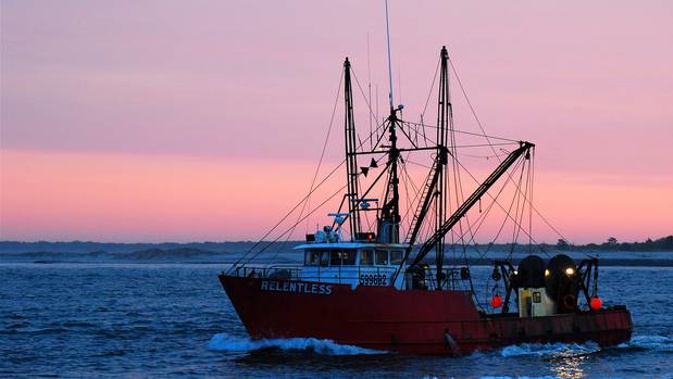
Proposals to vastly increase marine protections in the ailing Hauraki Gulf and ban trawling in all but "carefully selected" corridors have been revealed in a leaked document.
The document also outlines Oceans and Fisheries Minister David Parker's proposals to reform the New Zealand commercial fishing industry, including progress on the rollout of cameras on commercial vessels.
The document, produced for the Labour Party's Infrastructure and Environment Committee, outlines a suite of papers to be taken to Cabinet that will "underpin the Government's work on Oceans and Fisheries". It was reportedly leaked to the Act Party and published online.
A spokesman for Parker said the minister would not be commenting on any content of the leaked papers, and would be making announcements only after they'd been presented to Cabinet.
He declined to comment on the fact the document had been leaked.
One of the papers seeks agreement on the Government's response to the Sea Change Tai Timu Pai Pari Hauraki Gulf Marine Spatial Plan.
The plan was developed over four years by a cross-sector group and unveiled in 2016 to help stem the flow of sediment and other pollutants into the gulf, ease pressures on wildlife, reverse dwindling fish stocks, and restore the health of crucial ecosystems.
But the plan lay dormant for years, until the Government announced plans to revive it in late 2018 with a Ministerial Advisory Committee.
Progress has continued slowly, and the minister's paper seeks approval for the public release of the Government strategy, titled Revitalising the Gulf – Government Action on the Sea Change Plan.
"The Strategy's actions take an ecosystem-based approach to restoring the health of the Hauraki Gulf, and address the many pressures across its ecosystems," the paper says.
Actions include increasing the area under marine protection in the Gulf from "6.6 per cent to 17.6 per cent" by establishing 18 protected areas using new "High Protection Area and Seafloor Protection Area tools".
It is unclear exactly what form of protection these areas would entail, from no-take marine reserves - which currently cover just 0.3 per cent - through to Māori customary protections such as rāhui and ahu moana, community-based protection plans for specific areas.
The original Sea Change Plan does not mention a specific percentage to be protected, but the Hauraki Gulf Forum and a range of iwi, scientists and environmental NGOs have been calling for a minimum of 30 per cent to be under a form of protection.
The original plan suggested 13 new marine protected areas at the Mokohinau Islands, Little Barrier (Hauturu) Island, Cape Colville, Alderman (Ruamaahua) Islands, Mercury (Ahuahu) Islands, Slipper (Whakahau) Island, Whangateau Harbour, Kawau Islands, Tiritiri Matangi Islands, Noises Islands, Rangitoto and Motutapu, the Firth of Thames and the Motukawao Group.
It recommended extending existing marine reserves at Hahei (Te Whanganui a Hei Marine Reserve) and Leigh (Cape Rodney - Okakari Pt Marine Reserve).
The Government strategy would include complementary fishing restrictions, including the" exclusion of trawl fishing except within carefully selected 'trawl corridors' and targeted measures to help restore locally depleted stocks"," the paper said.
These measures would be progressed through a "Hauraki Gulf Fisheries Plan".
The strategy would enhance customary and recreational fishing experiences, and the connection people have with nature, also enable local communities to be more involved in management near-shore coastal areas, the paper said.
It recommended Cabinet agree to the public release of the strategy and actions proposed along with further engagement with mana whenua.
Another paper leaked revealed the next stages for the rollout of on-board cameras across inshore fishing fleet, following a Cabinet agreement in July 2020 to provide funding.
It said the minister intended to consult on the "appropriate level of recovery from industry", the mount recovered to at least offset the proposed additional funding of $10m over four years .
The paper sought approval for a single stage business case and agreement for Fisheries NZ to engage with the market to procure the on-board camera solution and progress an Implementation Business Case for the rollout.
Other papers outlined the new Oceans and Fisheries Ministry's "commitment to a more holistic, integrated approach to managing the oceans".
"Activities on land and at sea, and their cumulative effects, are negatively affecting the marine environment; and climate change is warming seas, with impacts on marine ecosystems expected to increase," the paper said.
The current approach to marine management was "fragmented" and had difficulty responding to these pressures in a holistic and timely manner.
It acknowledged progress on marine protection was slow relative to objectives under international treaties, and growth and innovation was also hindered.
Other papers included proposals to modernise the fishing management system, and a Fisheries Amendment Bill to "tighten commercial fishing rules for which fish must be landed, and which are required or allowed to be discarded at sea".
"This will incentivise fishers to minimise by-catch and catch fish they value."
Current rules resulted in "disincentives for good fishing practices", a paper said, outlining proposals to strengthen fishing rules and policies around illegal discarding of fish, improving effectiveness of on-board cameras and cost recovery .
The papers also included the proposed next steps to respond to the Prime Minister's Chief Science Adviser's report into the state of New Zealand's fisheries, and changes to the Māori Fisheries Act 2004, in line with recommendations in a 2015 review.
In publishing the document, Act leader David Seymour said it was a "mixed catch of initiatives".
He said it seemed the minister had consulted Labour MPs before consulting with the industry, and hoped it would not "throw the sector into chaos".
Take your Radio, Podcasts and Music with you









